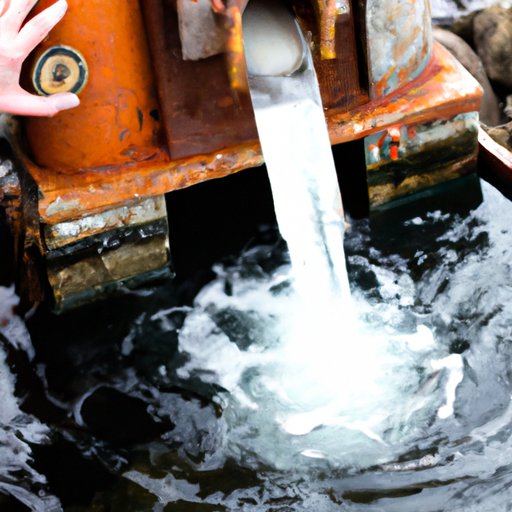Introduction
Well water can be a great source of clean, safe drinking water for many people. However, sometimes it can have an unpleasant odor that can make it difficult or even unpleasant to drink. If your well water smells bad, there are a few potential causes that you should investigate before attempting to find a solution. This article will explore the definition of smelly well water, overview the potential causes, and provide some tips on how to identify and address these issues.

Identifying the Causes of Smelly Well Water
The first step in solving smelly well water is understanding what causes it. There are several potential culprits, including bacteria, agricultural chemicals, iron, manganese, and other contaminants. Each of these can cause different types of odors, so it’s important to identify the source of the smell before attempting to fix it.

Exploring Common Solutions to Fix Smelly Well Water
Once you have identified the cause of the smell, there are several potential solutions you can try. Bacterial contamination can often be resolved by chlorination or shock treatments, while agricultural chemicals may require filtration systems. Iron and manganese can usually be removed using aeration or chemical treatments. Additionally, if your water contains other contaminants, you may need to install a filter to remove them.
Examining Potential Health Risks of Consuming Smelly Well Water
It’s important to note that drinking smelly well water can pose a significant health risk. Contaminants such as bacteria, agricultural chemicals, and iron can all lead to serious illnesses and diseases if they are consumed in large quantities. Therefore, it is important to take steps to ensure that your well water is safe to drink before consuming it.

Investigating the Role of Bacteria in Contaminating Well Water
Bacteria are one of the most common causes of smelly well water. Coliform bacteria, which is present in most soils, can enter wells through cracks or openings in the casing or through surface runoff. These bacteria can cause a variety of odors, ranging from musty or earthy smells to sulfuric or rotten egg odors. In order to prevent bacterial contamination, it is important to ensure that your well is properly sealed and that any surface runoff is diverted away from the wellhead.
Analyzing the Impact of Agricultural Chemicals on Well Water Quality
Agricultural chemicals, such as fertilizers and pesticides, can also contaminate well water. These chemicals can enter the water supply through runoff or leaching, and can cause a variety of odors, including musty, earthy, or chemical smells. To reduce the risk of contamination, it is important to use appropriate amounts of chemicals when applying them to crops and to divert runoff away from the wellhead.

Understanding How to Test for and Treat Iron and Manganese in Well Water
Iron and manganese are two of the most common minerals found in well water. While they are not necessarily harmful to consume, they can cause unpleasant odors and tastes in the water. The best way to test for these minerals is to have your water tested by a professional. If the levels are too high, you may need to treat the water with either aeration or chemical treatments.
Evaluating the Cost of Professional Well Water Treatment Services
If you have identified a contaminant in your well water and need to have it treated, you may want to consider hiring a professional for the job. Professional well water treatment services can vary widely in cost, depending on the severity of the problem and the type of treatment required. It is important to do research and get multiple quotes before deciding on a service provider.
Conclusion
Smelly well water can be caused by a variety of factors, including bacteria, agricultural chemicals, iron, and manganese. Identifying the source of the smell is the first step in resolving the issue. Once the cause has been identified, there are several potential solutions, including chlorination, shock treatments, filtration systems, aeration, and chemical treatments. Additionally, it is important to consider the potential health risks associated with consuming contaminated water. Finally, if you require professional well water treatment services, it is important to do research and get multiple quotes before making a decision.
In conclusion, smelly well water can be a nuisance, but it is important to identify the source of the smell before attempting to solve the problem. By understanding the potential causes and solutions, you can take steps to ensure that your well water is safe to drink.
(Note: Is this article not meeting your expectations? Do you have knowledge or insights to share? Unlock new opportunities and expand your reach by joining our authors team. Click Registration to join us and share your expertise with our readers.)
